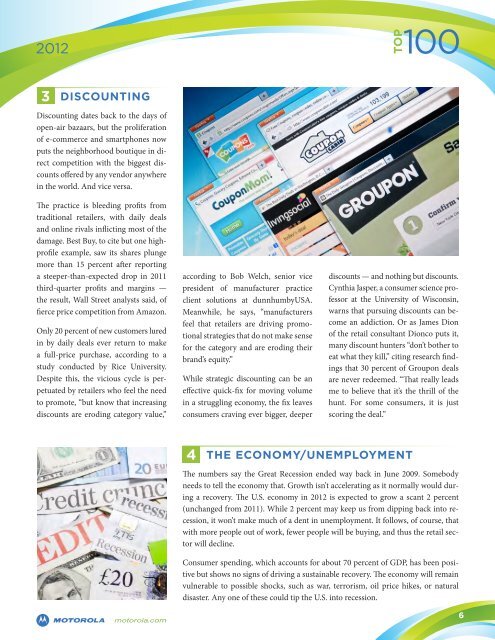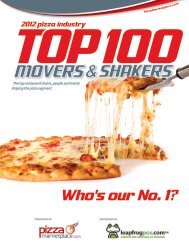2012 100 - Networld Media Group
2012 100 - Networld Media Group
2012 100 - Networld Media Group
Create successful ePaper yourself
Turn your PDF publications into a flip-book with our unique Google optimized e-Paper software.
3<br />
DISCOUNTING<br />
Discounting dates back to the days of<br />
open-air bazaars, but the proliferation<br />
of e-commerce and smartphones now<br />
puts the neighborhood boutique in direct<br />
competition with the biggest discounts<br />
offered by any vendor anywhere<br />
in the world. And vice versa.<br />
The practice is bleeding profits from<br />
traditional retailers, with daily deals<br />
and online rivals inflicting most of the<br />
damage. Best Buy, to cite but one highprofile<br />
example, saw its shares plunge<br />
more than 15 percent after reporting<br />
a steeper-than-expected drop in 2011<br />
third-quarter profits and margins —<br />
the result, Wall Street analysts said, of<br />
fierce price competition from Amazon.<br />
Only 20 percent of new customers lured<br />
in by daily deals ever return to make<br />
a full-price purchase, according to a<br />
study conducted by Rice University.<br />
Despite this, the vicious cycle is perpetuated<br />
by retailers who feel the need<br />
to promote, “but know that increasing<br />
discounts are eroding category value,”<br />
according to Bob Welch, senior vice<br />
president of manufacturer practice<br />
client solutions at dunnhumbyUSA.<br />
Meanwhile, he says, “manufacturers<br />
feel that retailers are driving promotional<br />
strategies that do not make sense<br />
for the category and are eroding their<br />
brand’s equity.”<br />
While strategic discounting can be an<br />
effective quick-fix for moving volume<br />
in a struggling economy, the fix leaves<br />
consumers craving ever bigger, deeper<br />
4<br />
discounts — and nothing but discounts.<br />
Cynthia Jasper, a consumer science professor<br />
at the University of Wisconsin,<br />
warns that pursuing discounts can become<br />
an addiction. Or as James Dion<br />
of the retail consultant Dionco puts it,<br />
many discount hunters “don’t bother to<br />
eat what they kill,” citing research findings<br />
that 30 percent of <strong>Group</strong>on deals<br />
are never redeemed. “That really leads<br />
me to believe that it’s the thrill of the<br />
hunt. For some consumers, it is just<br />
scoring the deal.”<br />
THE ECONOMY/UNEMPLOYMENT<br />
The numbers say the Great Recession ended way back in June 2009. Somebody<br />
needs to tell the economy that. Growth isn’t accelerating as it normally would during<br />
a recovery. The U.S. economy in <strong>2012</strong> is expected to grow a scant 2 percent<br />
(unchanged from 2011). While 2 percent may keep us from dipping back into recession,<br />
it won’t make much of a dent in unemployment. It follows, of course, that<br />
with more people out of work, fewer people will be buying, and thus the retail sector<br />
will decline.<br />
Consumer spending, which accounts for about 70 percent of GDP, has been positive<br />
but shows no signs of driving a sustainable recovery. The economy will remain<br />
vulnerable to possible shocks, such as war, terrorism, oil price hikes, or natural<br />
disaster. Any one of these could tip the U.S. into recession.<br />
6



